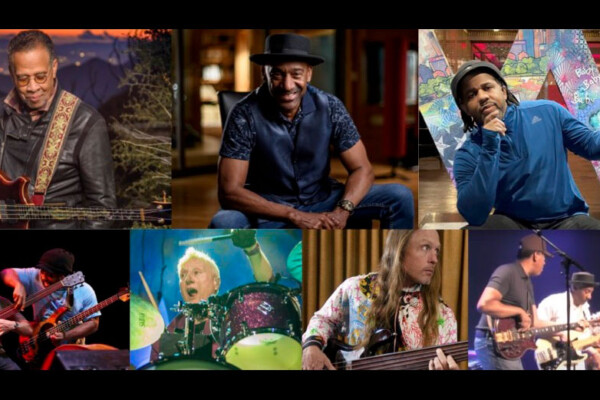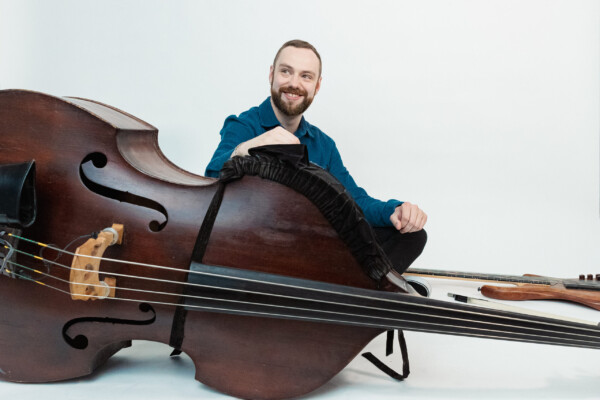Stanley Clarke’s “The Toys of Men”
 Stanley Clarke’s latest album, The Toys of Men, is being released October 16, 2007.
Stanley Clarke’s latest album, The Toys of Men, is being released October 16, 2007.
Sample the release and pre-order it at Heads Up’s web site.
Full release:
For centuries, the artist has served as the great counterbalance to the warrior. When statesmen in opposing camps rattle their swords and draw lines in the sand, it’s left to the creators to reach across the borders and hold civilization together. Such is the climate we find ourselves in at the dawn of the 21st century.
Stanley Clarke, one of the most innovative electric bass players of the past three decades – an artist and a creator in the truest sense of the words – examines the emotional sweep of war in The Toys of Men, his new CD set for worldwide release on Heads Up International / Roxboro Entertainment Group on October 16, 2007.
“If you study history, and the history of warfare, it boils down to some very simple dynamics,” says Clarke. “When there are disagreements and disputes between countries, people always go back to their toys and how they can use them to intimidate their adversaries. This goes all the way back to the days when we were fighting each other with swords and shields, and even rocks and clubs. It’s just a part of human nature, particularly with men. There’s this basic belief, however flawed as it might be, that the only way you’re really going to get what you want is by conquering someone or something. In those moments in history when we’ve been at war or on the brink of war, the whole idea of just allowing something to be what it is just doesn’t exist.”
This recurring phenomenon of human history is the topic of the album’s title track – a six-part suite and the cornerstone that opens the 13-song set and spans a range of colors – from the dark and violent to the uplifting and transcendent.
“When you listen to the song in all of its parts, it has a lot of different emotions going on in it,” Clarke explains. “There’s fear, there’s confusion, there’s chaos, all of those things that we associate with war and destruction. But at the end, in those segments entitled ‘The Opening of the Gates’ and ‘God Light,’ there’s ultimately hope.”
“Come On” and “Jerusalem,” the two tracks that follow the opening suite, carry a socio-political weight all their own. “’Come On’ is about letting go of the things that are holding you back, and finding some peace within yourself,” says Clarke. “Sometimes when I’m playing music, I just want to tell people, ‘Come on, drop the baggage. Drop the negative energy and be more positive.’”
“Jerusalem,” written by keyboardist Ruslan Sirota, a native of Israel, is a track whose gentle melody transcends the unrest that has plagued the revered Middle Eastern city for thousands of years and reconnects with its inherent beauty. “The middle part of the song reduces to nothing more than a single tone, and then it rises again,” says Clarke. “I’ve been to Jerusalem a number of times, and the song reminds me of a sunset I once saw there.”
Also among the highlights is “All Over Again,” an immigrant story with lyrics written and sung by up-and-coming acoustic bassist and vocalist Esperanza Spalding. The song is about a friend of Clarke’s who was forced to leave the U.S. – and the woman he loved – because of his immigration status. “This couple had been together for a while, and they were going to get married, but he had to leave,” Clarke recalls. “From a legal standpoint, there were no two ways about it. They petitioned the court, but it didn’t work out in his favor, so he left.”
The Brazilian-flavored “La Cancion de Sofia,” underscored by the subtle but infectious rhythms of percussionist Paulinho da Costa, is Clarke’s song to his wife. “She’s a very interesting woman,” he says. “She’s very forward thinking, because she’s an artist, yet very much a traditionalist at the same time. There’s this pull that she constantly experiences between looking toward the future and still having these old-school sensibilities at the same time. This piece just sounds like her.”
Also in the mix are a number of understated acoustic bass interludes, which collectively represent a relatively new tack for an artist who has built his reputation on fiery electric bass riffs. “I actually recorded those tracks in my dining room,” says Clarke. “It has a very high ceiling and a lot of wood. I just put the bass in there and rolled tape. I’ve really been practicing with the acoustic bass a lot in the last couple years, and I’ve developed some different techniques and styles. A lot of that has come from touring with Jean-Luc Ponty and Al Di Meola in Rite of Strings. Working with them, I’ve developed a way to play the acoustic bass as a truly solo instrument.”
The quiet interludes offer a glimmer of optimism in a moment of history that is plagued by war and global unrest. Despite the occasionally bleak subject matter of The Toys of Men, Clarke’s outlook remains generally optimistic.
“I do believe that civilization is headed toward a golden age,” he says. “I may not see it in my lifetime, but I do believe that people approach their differences with at least a little more civility than they did in earlier centuries. I think there will come a day when men will in fact drop the baggage and the negative energy once and for all, put down the dangerous toys and talk to each other like human beings.”



